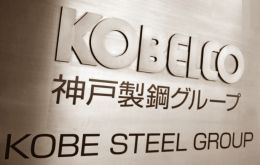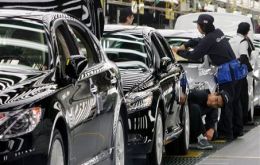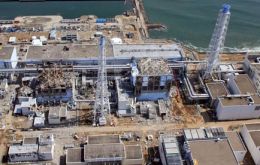MercoPress. South Atlantic News Agency
Tag: Toyota
-
Saturday, October 14th 2017 - 08:16 UTC
Japan's steel scandal of falsifying quality data has global manufacturing repercussions

Japan's Kobe Steel has increased the number of firms it says have been affected by its data fabrication scandal from 200 to 500, and has also found “inappropriate actions” relating to nine more products, including falsifying data. Earlier this week, Kobe admitted falsifying quality data on some of its products for up to a decade.
-
Wednesday, July 5th 2017 - 03:31 UTC
Brazil records brand new car sales recovery in first half of 2017

The sale of brand new cars in Mercosur giant Brazil went up 3.65 percent in the first half of 2017 compared to the same period of 2016 and crossing the psychologically significant 1-million-unit mark, according to auto industry sources. Brazil has been a traditional top-10 global market for cars.
-
Tuesday, January 31st 2017 - 22:21 UTC
Volkswagen overtakes Toyota as world's top leading automaker in 2016

Toyota lost its crown as the world's top-selling automaker in 2016, company figures showed Monday, with the Japanese giant overtaken by Volkswagen as the industry prepares for an uncertain trade environment under Donald Trump. The German automaker moved back into the top spot despite being hit by a massive emissions cheating scandal that rocked its reputation.
-
Wednesday, July 29th 2015 - 05:52 UTC
Volkswagen overtakes Toyota to became world's biggest selling vehicle maker

Germany's Volkswagen became the world's biggest-selling vehicle maker in the first half of the year, overtaking Toyota for the first time. VW sold 5.04 million cars between January and June - slightly more than the 5.02 million sold by Toyota.
-
Friday, September 20th 2013 - 20:17 UTC
Toyota plan to invest 800m dollars in Argentina and increase production by 50%

Japanese car maker Toyota Motor Corp. plans to invest 800 million dollars to boost production capacity at a factory in the province of Buenos Aires. The plan unveiled by Argentine Industry Minister Debora Giorgi will almost double the size of the factory and allows to increase vehicle output to 140,000 units a year from 92,000 currently.
-
Tuesday, August 6th 2013 - 03:01 UTC
General Motors ahead of Toyota and Volkswagen in the global car industry

General Motors outsold Toyota for the first time in six quarters, rising atop the industry and underscoring the resurgence of US automakers.
-
Friday, August 10th 2012 - 08:27 UTC
Toyota opens third plant in Brazil and announces engine plant

Toyota from Japan has inaugurated its third plant in Brazil that aims to produce 70,000 cars a year. The facility, located 90 kilometres west of Sao Paulo in Sorocaba, will begin producing Etios compact cars next month, with engines imported from Japan.
-
Tuesday, July 5th 2011 - 05:44 UTC
Toyota Mercosur temporarily closing plants due to lack of parts

Toyota, the world's biggest automaker said Monday it will temporarily halt work at factories in Brazil and Argentina due to the lack of parts from Japan after the massive March quake and tsunami.
-
Saturday, May 28th 2011 - 07:18 UTC
Tough prospects for Japan: car output down; credit rating lowered and recession

A complicated week for Japan: car production in April plunged as manufacturers continue to face a shortfall in parts supply and credit rating agencies downgraded the outlook on the country’s debt to negative from stable.
-
Tuesday, April 26th 2011 - 16:47 UTC
Toyota production cuts in Mercosur plants because of Japan parts shortage

Toyota executives in Brazil and Argentina announced they are cutting production at two assembly plants for three days because they don’t have enough parts from Japan due to the recent earthquake and tsunami.
